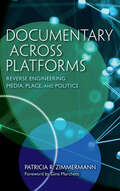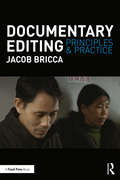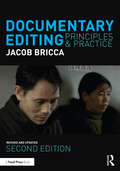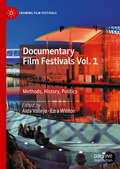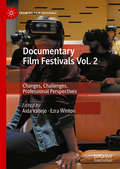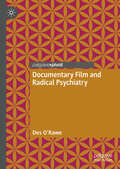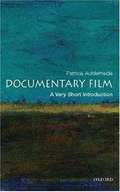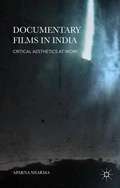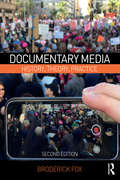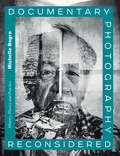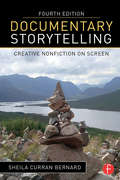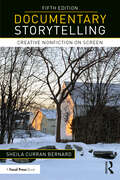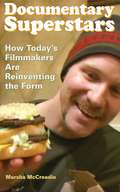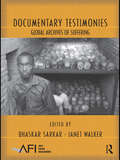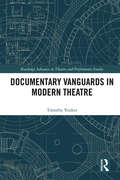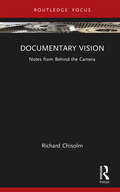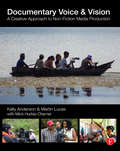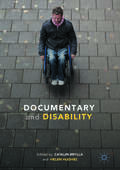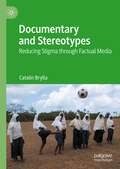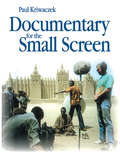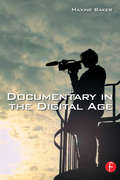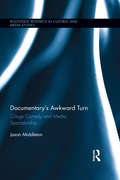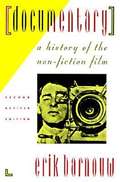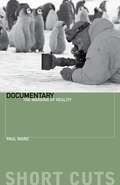- Table View
- List View
Documentary Across Platforms: Reverse Engineering Media, Place, and Politics
by Patricia R. ZimmermannEssays “capturing media ecologies as varied as museum installations, film festival showings, photography, and multiple varieties of internet sharing.” —Jump CutIn Documentary Across Platforms, noted scholar of film and experimental media Patricia R. Zimmermann offers a glimpse into the ever-evolving constellation of practices known as “documentary” and the way in which they investigate, engage with, and interrogate the world.Collected here for the first time are her celebrated essays and speculations about documentary, experimental, and new media published outside of traditional scholarly venues. These essays envision documentary as a complex ecology composed of different technologies, sets of practices, and specific relationships to communities, engagement, politics, and social struggles. Through the lens of reverse engineering—the concept that ideas, just like objects, can be disassembled to learn how they work and then rebuilt into something new and better—Zimmermann explores how numerous small-scale documentary works present strategies of intervention into existing power structures. Adaptive to their context, modular, and unfixed, the documentary practices she explores exploit both sophisticated high-end professional and consumer-grade amateur technologies, moving through different political terrains, different platforms, and different exhibition contexts.Together these essays demonstrate documentary’s role as a conceptual practice to think through how the world is organized and to imagine ways that it might be reorganized with actions, communities, and ideas.
Documentary Editing: Principles & Practice
by Jacob BriccaDocumentary Editing offers clear and detailed strategies for tackling every stage of the documentary editing process, from organizing raw footage and building select reels to fine cutting and final export. Written by a Sundance award- winning documentary editor with a dozen features to his credit and containing examples from over 100 films, this book presents a step-by-step guide for how to turn seemingly shapeless footage into focused scenes, and how to craft a structure for a documentary of any length. The book contains insights and examples from seven of America’s top documentary editors, including Geoffrey Richman (The Cove, Sicko), Kate Amend (The Keepers, Into the Arms of Strangers), and Mary Lampson (Harlan County U.S.A.), and a companion website contains easy-to-follow video tutorials. Written for both practitioners and enthusiasts, Documentary Editing offers unique and invaluable insights into the documentary editing process. The companion website is still in production. In the meantime, you can access Jacob's video tutorials on his YouTube Channel at the following URL: https://www.youtube.com/channel/UCKW7MVayB_-Cs4cCM47jdKQ?disable_polymer=true
Documentary Editing: Principles & Practice
by Jacob Bricca, ACEThis book offers clear and detailed strategies for tackling every stage of the documentary editing process, from organizing raw footage and building select reels to fine cutting and final export. Written by a Sundance award-winning documentary editor with a dozen features to his credit and containing examples from over 100 films, this book presents a step-by-step guide for how to turn seemingly shapeless footage into focused scenes, and how to craft a structure for a documentary of any length. The book contains insights and examples from seven of America’s top documentary editors, including Geoffrey Richman, ACE (The Cove, Tiger King), Kate Amend, ACE (¡Viva Maestro!, The Keepers), and Mary Lampson (Harlan County U.S.A.). Written for both practitioners and enthusiasts, this book offers unique and invaluable insights into the documentary editing process. The second edition is completely revised and updated with contemporary examples and contains a new chapter titled, "Editing the Short Documentary."
Documentary Film Festivals Vol. 1: Methods, History, Politics (Framing Film Festivals)
by Ezra Winton Aida VallejoThis book provides the first comprehensive overview of the global landscape of documentary film festivals. Contributors from across the globe offer in-depth analysis of both internationally renowned and more alternative festivals, including Hot Docs (Canada), Nyon (Switcherland), Yamagata (Japan), DocChina, Full Frame (US), Belgrade (former Yugoslavia), Vikalp (India), and DocsBarcelona (Catalonia, Spain), among others. With a special focus on historical and political developments, this first volume draws a map of documentary festivals operating today, and then looks at their origins and evolution. This volume is organized in three sections: the first addresses methodological problems film historians and social scientists face when researching documentary film festivals, the second looks at the historical development of this circuit within the wider frame of history of world and national cinemas, and the third reflects on how politics find their way through festival programs and actions. Curatorial, organizational, industrial and political changes occurred in the festival realm addressed in this book help better understand how these affected documentary production, distribution, curation, exhibition and reception up to this day.
Documentary Film Festivals Vol. 2: Changes, Challenges, Professional Perspectives (Framing Film Festivals)
by Ezra Winton Aida VallejoThis book provides the first comprehensive overview of the global landscape of documentary film festivals, looking at its contemporary and future challenges. Contributors from across the globe reflect on how documentary has positioned itself within both internationally renowned and more alternative festivals, including IDFA (Netherlands), Cannes IFF (France), Sheffield Doc/Fest (UK), Dockanema (Mozambique), Ismailia (Egypt) and Zinebi (Basque Country, Spain), among others. With a special focus on industrial and curatorial developments, this second in a two-volume set looks at recent changes occurred in the festival circuit, such as the proliferation of markets and co-production forums, the inclusion of interactive and VR forms within their programs and the irruption of VOD platforms, and analyse how these affect the future of documentary aesthetics and its production/distribution contexts.This volume is organized in two sections: the first reflects on how the documentary festival circuit has become a key industry node for contemporary documentary and identifies new curatorial trends at documentary and major film festivals. The second gives voice to professionals working for festivals and institutions who collaborate with them, who share inside knowledge and concerns, regarding the future challenges to be faced by documentary in the near future.
Documentary Film and Radical Psychiatry
by Des O'RaweThis book examines how documentary film responded to the methods and controversies associated with radical psychiatry, especially during the long 1960s. Broad in scope and comparative in approach, it discusses a range of films in terms of how their production histories and visual styles were influenced by wider cultural, technological, and autobiographical factors. The book argues that documentary filmmaking offers both an important critical perspective on psychiatric treatments, institutions, and attitudes, as well as contributing to a critique of how normative modes of being are constructed across mainstream media and popular culture. In their negotiations with the politics of psychiatry, such films will often question the ethnographic and observational integrity of the documentary or “non-fiction” form itself, especially when it adopts diaristic, interactive, socially engaged and advocatory strategies to represent mental illness and healthcare provision. The relationship between documentary film and the constellation of insights, arguments, communities, and individuals associated with the moment of radical psychiatry remains a complex but indispensable legacy of the post-war era.
Documentary Film: A Very Short Introduction
by Patricia AufderheideDocumentary film can encompass anything from Robert Flaherty's pioneering ethnography Nanook of the North to Michael Moore's anti-Iraq War polemic Fahrenheit 9/11, from Dziga Vertov's artful Soviet propaganda piece Man with a Movie Camera to Luc Jacquet's heart-tugging wildlife epic March of the Penguins. In this concise, crisply written guide, Patricia Aufderheide takes readers along the diverse paths of documentary history and charts the lively, often fierce debates among filmmakers and scholars about the best ways to represent reality and to tell the truths worth telling. Beginning with an overview of the central issues of documentary filmmaking--its definitions and purposes, its forms and founders--Aufderheide focuses on several of its key subgenres, including public affairs films, government propaganda (particularly the works produced during World War II), historical documentaries, and nature films. Her thematic approach allows readers to enter the subject matter through the kinds of films that first attracted them to documentaries, and it permits her to make connections between eras, as well as revealing the ongoing nature of documentary's core controversies involving objectivity, advocacy, and bias. Interwoven throughout are discussions of the ethical and practical considerations that arise with every aspect of documentary production. A particularly useful feature of the book is an appended list of "100 great documentaries" that anyone with a serious interest in the genre should see. Drawing on the author's four decades of experience as a film scholar and critic, this book is the perfect introduction not just for teachers and students but also for all thoughtful filmgoers and for those who aspire to make documentaries themselves.
Documentary Films in India
by Aparna SharmaThis book introduces the diverse practices of documentary films in India. It examines the oeuvres of three non-canonical practitioners: ethnographic filmmaker, David MacDougall; northeast India-based moving-image artists group, Desire Machine Collective; and avant-garde filmmaker and cinema philosopher, Kumar Shahani. Sharma offers in-depth analysis of these practitioners' distinct documentary methods and aesthetics, exploring how their oeuvres constitute a critical and self-reflexive approach to documentary-making in India.
Documentary Media: History, Theory, Practice
by Broderick FoxIn a digital moment where both the democratizing and totalitarian possibilities of media are unprecedented, the need for complex, ethical, and imaginative documentary media—for you, the reader of this book to think, question, and create—is vital. Whether you are an aspiring or seasoned practitioner, an activist or community leader, a student or scholar, or simply a curious audience member, author Broderick Fox opens up documentary media, its changing forms, and diversifying social functions to readers in a manner that is at once rigorous, absorbing, and practical. This new edition updates and further explores the various histories, ideas, and cultural debates that surround and shape documentary practice today. Each chapter engages readers by challenging traditional assumptions, posing critical and creative questions, and offering up innovative historical and contemporary examples. Additionally, each chapter closes with an "Into Practice" section that provides analysis and development exercises and hands-on projects that will assist you in generating a full project prospectus, promotional trailer, and web presence for your own documentary.
Documentary Photography Reconsidered: History, Theory and Practice
by Michelle BogreDocumentary photography is undergoing an unprecedented transformation as it adapts to the impact of digital technology, social media and new distribution methods. In this book, photographer and educator Michelle Bogre contextualizes these changes by offering a historical, theoretical and practical perspective on documentary photography from its inception to the present day. Documentary Photography Reconsidered is structured around key concepts, such as the photograph as witness, as evidence, as memory, as narrative and as a vehicle for activism and social change. Chapters include in-depth interviews with some of the world's leading contemporary practitioners, demonstrating the wide variety of different working styles, techniques and topics available to new photographers entering the field. Every key concept is illustrated with work from a range of innovative, influential and often under-represented photographers, giving a flavor of the depth and range of projects from the history of this global art form. There are also creative projects designed to spark ideas and build skills, to help you conceive, develop and produce your own meaningful documentary projects. The book is supported by a companion website, which includes in-depth video interviews with featured practitioners.
Documentary Storytelling: Creative Nonfiction on Screen
by Sheila Curran BernardDocumentary Storytelling has reached filmmakers and filmgoers worldwide with its unique focus on the key ingredient for success in the growing global documentary marketplace: storytelling. This practical guide reveals how today's top filmmakers bring the tools of narrative cinema to the world of nonfiction film and video without sacrificing the rigor and truthfulness that give documentaries their power. The book offers practical advice for producers, directors, editors, cinematographers, writers and others seeking to make ethical and effective films that merge the strengths of visual and aural media with the power of narrative storytelling. In this new, updated edition, Emmy Award-winning author Sheila Curran Bernard offers: New strategies for analyzing documentary work New conversations with filmmakers including Stanley Nelson (The Black Panthers), Kazuhiro Soda (Mental), Orlando von Einsiedel (Virunga), and Cara Mertes (JustFilms) Discussions previously held with Susan Kim (Imaginary Witness), Deborah Scranton (The War Tapes), Alex Gibney (Taxi to the Dark Side), and James Marsh (Man on Wire).
Documentary Storytelling: Creative Nonfiction on Screen
by Sheila Curran BernardFor nearly two decades, Documentary Storytelling has reached filmmakers and filmgoers worldwide with its unique focus on the key ingredient for success in the global documentary marketplace: storytelling. As this revised, updated fifth edition makes clear, nonfiction storytelling is not limited to character-driven journeys, but instead encompasses the diverse ways in which today’s top documentarians reach audiences with content that is creative, original, and often inspirational, all without sacrificing the integrity that gives documentary its power. This book is filled with practical advice for writers, producers, directors, editors, cinematographers, and others committed to reality-based filmmaking that seeks to reach audiences, raise awareness, address social issues, illuminate the human condition, and even entertain. In this new edition, Emmy Award-winning filmmaker and author Sheila Curran Bernard offers: a closer look at the way ethical nonfiction filmmakers take creative, authorial leaps while also remaining transparent with audiences; new tools for understanding how documentaries are structured, how they may rearrange time for storytelling effect, and how a simple narrative throughline can convey complexity without being a conventional "hero’s journey"; new conversations with filmmakers and educators including Dawn Porter, Madison Hamburg, Tracy Heather Strain, June Cross, Heidi Gronauer, and Julie Casper Roth, and another look at conversations with Stanley Nelson and Orlando von Einsiedel. Please visit the book’s website, available at www.documentarystorytelling.com, for further information, related articles, and more.
Documentary Superstars: How Today's Filmmakers Are Reinventing the Form
by Marsha MccreadieMcCreadie (documentary film, Fordham U.) explores changing trends in documentary filmmaking, and notes how current documentarians such as Michael Moore and Morgan Spurlock are becoming "glamorous Hollywood figures." Written for film students and fans of documentaries, this volume profiles leading figures in the field to show how the art form now employs rabble-rousing, charisma, humor and a visionary attitude in order to cross boundaries and become more accessible to mainstream audiences.
Documentary Testimonies: Global Archives of Suffering (AFI Film Readers)
by Janet Walker Bhaskar SarkarDocumentary Testimonies examines documentary films that compel us to bear witness, move us to anger or tears, and possibly mobilize us to action. Comprising ten new essays and a substantive introduction, this interdisciplinary volume examines audiovisual testimonial practices, forms, and institutions. Topics include: technologies of capture, storage and circulation; problems of historical veracity/frail memory; generation of video archives--official, renegade, and ephemeral; limits and potentialities of documentary as public record; architectonics of memory; ethics of witnessing and commemoration; human rights and activist publics. The essays provide in-depth analysis of archives of social suffering tied to particular locales: Cambodia, Chiapas, Darfur, India, Indonesia, Korea, New Orleans, Norway, Rwanda, South Africa, and Washington, DC. The contributors focus on the generation and use of testimony by public administrators and institutions, human rights activists, documentary filmmakers, and others with interest in environmental justice, human rights, social advocacy, and the commemoration/prevention of genocide. Thus, this volume aims to investigate, from a critical and translocal perspective, testimony as social practice.
Documentary Vanguards in Modern Theatre (Routledge Advances in Theatre & Performance Studies)
by Timothy YoukerPractitioners and critics alike often attribute great authenticity to documentary theatre, casting it as a salutary alternative not only to corporate news outlets and official histories but also to the supposed "self-indulgence" and "elitism" of avant-garde theatre. Documentary Vanguards in Modern Theatre, by contrast, argues for treating documentarians as vanguardists who (for good or ill) push, remap, or transgress the margins of historical and political visibility, often taking issue with professional discourses that claim a monopoly on authoritative representations of the real. This is the first book to situate documentary theatre’s development within the larger story of theatrical experimentalism, collage art, collective ritual, and other avant-garde dramaturgical and performance practices of the late 19th and 20th Centuries.
Documentary Vision: Notes from Behind the Camera
by Richard ChisolmThis book is a collection of personal essays that address critical elements involved in the production of nonfiction films. Written by an experienced documentary filmmaker and cinematographer, the book draws upon practical wisdom to explore the nuances and challenges faced by filmmakers and viewers alike. Included in the text are rarely discussed ethical issues, best practices in the field, filmmaker etiquette, and a detailed analysis of interview techniques. The book also provides a candid view of how decisions are made in production that are consequential to a finished film’s meaning and fidelity. Drawing on a wide range of subject matter, it will enhance the reader's understanding of the tremendous power and potential of the documentary medium. The book offers an invaluable insight into documentary filmmaking for professionals who work in the medium and students who are learning the trade and honing their skills.
Documentary Voice & Vision: A Creative Approach to Non-Fiction Media Production
by Martin Lucas Kelly AndersonLearn the creative and technical essentials of documentary filmmaking with Documentary Voice & Vision. This comprehensive work combines clear, up-to-date technical information, production techniques and gear descriptions with an understanding of how technical choices can create meaning and serve a director’s creative vision. Drawing on the authors’ years of experience as documentary filmmakers, and on interviews with a range of working professionals in the field, the book offers concrete and thoughtful guidance through all stages of production, from finding and researching ideas to production, editing and distribution. Documentary Voice & Vision will help students and aspiring filmmakers think though research and story structure, ethics, legal issues and aesthetics, as well as techniques from camera handling to lighting, sound recording and editing. The book explores a full range of production styles, from expository to impressionistic to observational, and provides an overview of contemporary distribution options. Documentary Voice & Vision is a companion text to Mick Hurbis-Cherrier’s Voice & Vision: A Creative Approach to Narrative Film and DV Production, and employs a similar style and approach to that classic text. This text is written from the perspective of documentary filmmakers, and includes myriad examples from the world of non-fiction filmmaking. A robust companion website featuring additional resources and interactive figures accompanies the book.
Documentary and Disability
by Catalin Brylla Helen HughesThis edited collection of contributions from media scholars, film practitioners and film historians connects the vibrant fields of documentary and disability studies. Documentary film has not only played an historical role in the social construction of disability but continues to be a strong force for expression, inclusion and activism. Offering essays on the interpretation and conception of a wide variety of documentary formats, Documentary and Disability reveals a rich set of resources on subjects as diverse as Thomas Quasthoff's opera performances, Tourette syndrome in the developing world, queer approaches to sexual functionality, Channel 4 disability sports broadcasting, the political meaning of cochlear implant activation, and Christoph's Schlingensief's celebrated Freakstars 3000.
Documentary and Stereotypes: Reducing Stigma through Factual Media
by Catalin BryllaThis book studies how documentaries, and factual media in general, can contribute to the reduction of social stigma and prejudice. It adopts models from social psychology, media studies and cultural studies and is intended for scholars and media makers who aim to increase social inclusion and diversity by deconstructing harmful boundaries between social groups. Such boundaries may be based on the stereotyping of ethnicity, culture, age, dis/ability, gender and sexual orientation, for example. The first part of the book outlines the functionality of stereotypes as essential processes for social cognition both in real life and during documentary viewing. The second part establishes a classification system for stigmatising media stereotypes and formulates a methodology based on critical discourse analysis to analyse them in narrative and audio-visual representations. The third and final part of the book conceptualises a set of methodologies to reduce stigmatising stereotypes. These methodologies are based on 1) representations that prompt perspectival alignment with screen characters, and 2) the perceived salience of multiple, intersecting social identities.
Documentary for the Small Screen
by Paul KriwaczekFilm and video have grown to be as significant in our time as books, newspapers and magazines. Documentary film-making is fast becoming as important and useful a skill as the ability to write well. Like writing, it can be learned by anyone. Film and video have grown to be as significant in our time as books, newspapers and magazines. Documentary film-making is fast becoming as important and useful a skill as the ability to write well. Like writing, it can be learned by anyone.Documentary for the small screen is both for those who are new to documentary film-making but want to know how to create productions of a professional standard, as well as for those already working in the medium who wish to improve their skills by taking a closer look at the way they carry out their tasks. It is written in a logical, straightforward way, the first half taking the reader through an analysis of what documentary actually is, to constructing it through developing the story and assembling the appropriate building-blocks. In the second part, the pre-production stages of preparing proposals, costings and outlines, and researching the subject are all carefully examined, as are production planning and the shoot, followed by the post-production stages involved in editing and reviewing the completed film. Paul Kriwaczek is an award winning documentary maker who has a wealth of experience to pass on, having worked for many years at BBC Television where he wrote, directed and produced documentary, drama, music and science programmes.
Documentary in the Digital Age
by Maxine BakerIf you want to learn from the leading lights of today's revolution in documentary filmmaking Maxine Baker has written the guide you need to own. You'll discover the many different and innovative approaches to documentary form and style arising from the use of innovative new technology. A tribute to the mavericks of creativity, inside you will find interviews and advice from groundbreaking documentary makers from the UK, USA and Europe as well as extensive listings of useful worldwide contacts and organisations. Any and every fan of the documentary will experience anew the passion and wonder of the Factual Film.Published review:"This is a must-have insight into modern documentary; the principles that govern it and the conventions it often breaks. It deserves a place on the shelves of film commissioners, film students and documentary consumers as prominent as the place these documentary filmmakers have carved for themselves on our screens." - www.shootingpeople.org
Documentary's Awkward Turn: Cringe Comedy and Media Spectatorship (Routledge Research in Cultural and Media Studies)
by Jason MiddletonDespite the prominence of "awkwardness" as cultural buzzword and descriptor of a sub-genre of contemporary film and television comedy, it has yet to be adequately theorized in academic film and media studies. Documentary’s Awkward Turn contributes a new critical paradigm to the field by presenting an analysis of awkward moments in documentary film and other reality-based media formats. It examines difficult and disrupted encounters between social actors on the screen, between filmmaker and subject, and between film and spectator. These encounters are, of course, often inter-connected. Awkward moments occur when an established mode of representation or reception is unexpectedly challenged, stalled, or altered: when an interviewee suddenly confronts the interviewer, when a subject who had been comfortable on camera begins to feel trapped in the frame, when a film perceived as a documentary turns out to be a parodic mockumentary. This book makes visible the ways in which awkwardness connects and subtends a range of transformative textual strategies, political and ethical problematics, and modalities of spectatorship in documentary film and media from the 1970s to the present.
Documentary: A History Of The Non-Fiction Film
by Erik BarnouwNow brought completely up to date, the new edition of this classic work on documentary films and filmmaking surveys the history of the genre from 1895 to the present day. With the myriad social upheavals over the past decade, documentaries have enjoyed an international renaissance; here Barnouw considers the medium in the light of an entirely new political and social climate. He examines as well the latest filmmaking technology, and the effects that video cassettes and cable television are having on the production of documentaries. And like the previous editions, Documentary is filled with photographs, many of them rare, collected during the author's travels around the world. Covering the full course of the documentary from Louis Lumiere's first effort to recent landmark productions such as Shoah, this book makes the growing importance of a unique blend of art and reality accessible and understandable to all film lovers.
Documentary: The Margins of Reality
by Paul WardIn using case studies such as Touching the Void (2003) and the films of Nick Broomfield, this timely introduction to the growing field of documentary explores the definition and understanding of the form, as well as the relationship between documentary and drama, specifically the notion of reconstruction and reenactment. Paul Ward also discusses animated documentaries, the fertile genre of comedy, and feature-length contemporary works that have achieved widespread cinematic release.
Documentary: The Margins of Reality (Short Cuts)
by Paul WardIn using case studies such as Touching the Void (2003) and the films of Nick Broomfield, this timely introduction to the growing field of documentary explores the definition and understanding of the form, as well as the relationship between documentary and drama, specifically the notion of reconstruction and reenactment. Paul Ward also discusses animated documentaries, the fertile genre of comedy, and feature-length contemporary works that have achieved widespread cinematic release.
